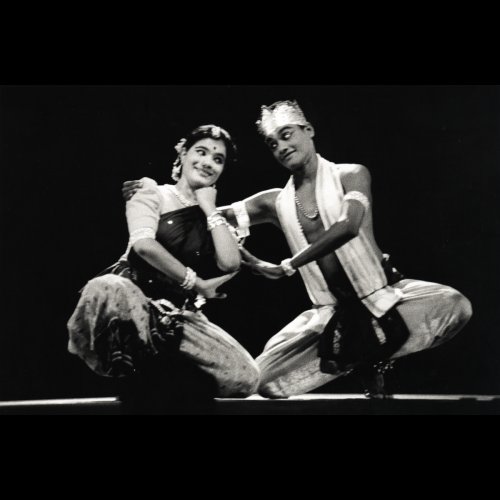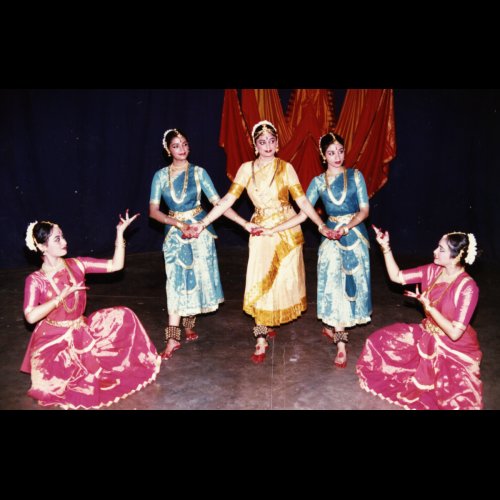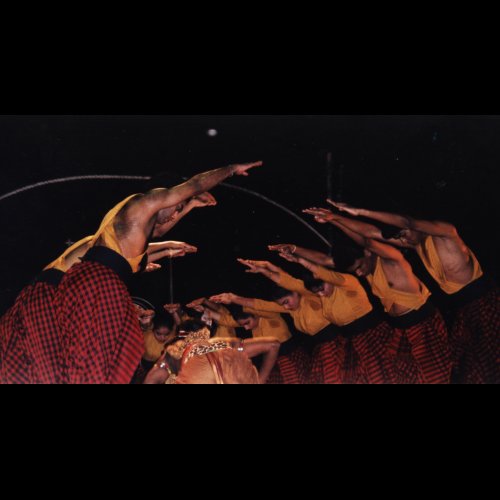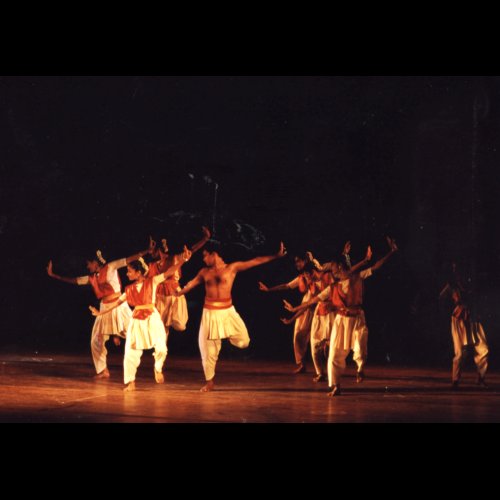- Bharatakalanjali Productions
- Collaborations
- Students Productions
Students Productions

Tagore’s TASHERDESH (1994)
This production resulted from the work of Bharata Kalanjali’s crop of young artistes, working with pupils drawn from various younger levels of the institution. A program by the young and created for the young, Tasherdesh was presented on July 2, 1994 by the students of Bharata Kalanjali to the Dhananjayans as a Silver Jubilee surprise package, to felicitate them. No guru could expect a grander and personal felicitation than this one.
Tasherdesh highlights the need for youth to rid themselves of temptation to follow the beaten path dictated by social pressures. It advocates experimentation and innovation, which however, should rest on tradition and an awareness of the milieu. Tasherdesh stands apart for its inherently social theme, targeted specifically at youth.
“Preethi Vasudevan and my son Satyajit planned the whole thing. The music was already there, but they rearranged it completely with a contemporary feel to it, by bringing in musicians who play for films and recorded it. The whole thing was kept very secret, the rehearsals were not at Bharata Kalanjali, only the participating students knew of this. We were away in US for our annual gurukulam camp and did not know anything of this.”
AGNI SAMBHUTA – DRAUPADI (1996)
Synopsis
Draupadi is one among the five virgins or Panchakanyas enunciated by Hindu mythological texts. Since she is not born of the womb, she’s ‘Ayonija’. She’s born of the sacrificial fire, hence Agni Sambhuta. Three previous births of hers are mentioned by the various puranas as Maya Sita, Nalayani – wife of sage Maudgalya, and Indrasena – daughter of a King who ruled Varanasi.
In this dance feature, Draupadi’s previous birth as Nalayani, is depicted. Nalayani is married to an aged sage, Maudgalya, who is happy with her loyalty and grants her a boon by which he becomes young and both of them enjoy their youth taking different forms. Yet Nalayani’s lust is unquenched. The sage curses her that she will have her desires fulfilled only in her future births. Before she meditates and immolates herself, Lord Shiva appears to her while she utters ‘Patim dehi’ five times. Shiva grants her 5 husbands in her next birth.
When King Drupada performs the ‘Putrakameshti’ yagna, Draupadi is delivered unto him through the sacrificial fire.
A major part of the dance revolves around Draupadi, her birth from the fire, her marriage to the Pandavas, her humiliation in the court of the Kauravas, her appeal to the elders, their indifferences, her determination to avenge the insult, her appeal to Lord Krishna to fail the conciliatory process, her decisive urge for war and finally her coronation.
Review
“It was a neat and sophisticated presentation.”
“The choreography of Anitha revealed her expertise in Bharatanatyam and her capacity in handling the powerful dramatic element in the feature. She herself played the leading role with dignity and poise…”


MOUNA KURAL (1996)
This production was handled in its entirety by the students of Bharata Kalanjali.
For the International Women’s Year, the British Council commissioned Bharata Kalanjali to make a presentation on a women oriented theme. Since the Dhananjayans had other commitments, they entrusted the project to Satyajit and V R Devika. The main story was by Mangai.
Synopsis
The subject was mythological and the main characters were Sita, Panchali and Savithri. A gypsy lady sees the palm of a college girl and predicts that she will be like Sita. The girl says she does not want to be like Sita who has been through many wretched experiences. Then Sita’s story is portrayed in dance like a flashback. The costumes by Shanta and choreography by Satyajit were given a contemporary treatment. Music was composed by V S Narasimhan.
RAS-SAMUDRA (1999)
This very unique production was propelled by late Rajeshkumar Balakrishnan (who had a meteoric rise in the field of dance, but cruel destiny snatched him early in a tragic accident in 2000 May) and Preethi Athreya, helped by all staff and senior students of Bharatakalanjali. With 84 dance participants and 20 production crew members, Ras-samudra was a remarkable, mammoth production by senior and junior disciples of the Dhananjayans. The photos reveal the professional quality of the production, proving that they are worthy disciples of worthy GURUS.
Synopsis
Ras-samudra symbolises ‘an ocean of feeling’. The variety, depth and fleeting nature of human feeling forms the basis of this production.
The human emotions & feelings of togetherness, sensuousness, mischief, laughter, intoxication, curiosity, fantasy, celebration, envy, hostility, accusations, panic, rage, and finally the peace, were strung together to recorded music taken from various productions of Bharatakalanjali and prerecorded cassettes available in the market. It is a breath taking kaleidoscope of movement and music mosaic. This was a surprise gift to Sri. Dhananjayan on his 60th day.

